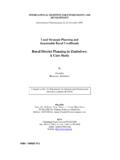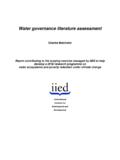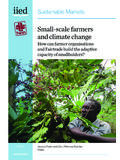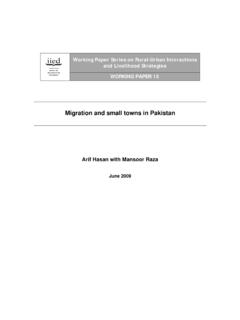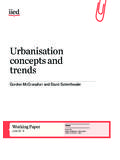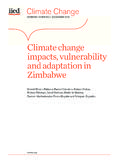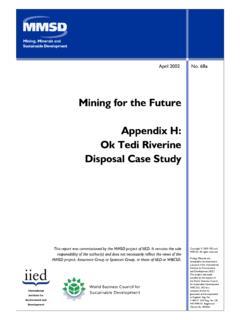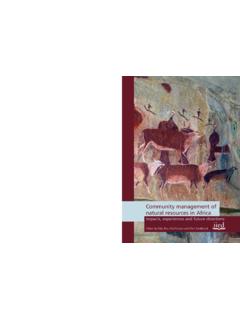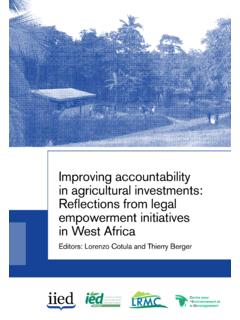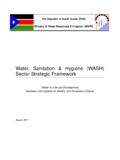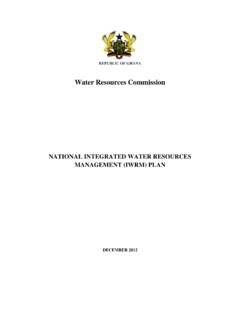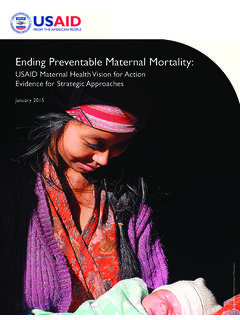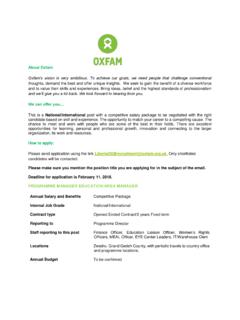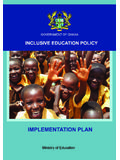Transcription of A Review of Needs Assessment Tools, Response Analysis ...
1 Working PaperNovember 2016 Policy and planning; UrbanKeywords:Humanitarian Response ; Conflict; Urban; Refugees; Local GovernmentA Review of Needs Assessment Tools, Response Analysis Frameworks, and Targeting Guidance for Urban Humanitarian Response Lili Mohiddin and Gabrielle SmithURBAN CRISESI nternational Institute for Environment and Development 80-86 Gray s Inn Road, London WC1X 8NH, UK Tel: +44 (0)20 3463 7399 Fax: +44 (0)20 3514 9055 email: @iied more publications at the authorsGabrielle Smith is a freelance consultant with over ten years experience in social and economic development, social protection and humanitarian programming. She is a cash transfer specialist with extensive knowledge of markets based programming and of cash assistance in urban contexts.
2 Recent assignments include a lessons-learnt Review of cash coordination during the Response to Typhoon Haiyan in the Philippines, and an evaluation of the European Commission s Humanitarian Aid and Civil Protection (ECHO) department s global cash and voucher programme portfolio. Prior to this she worked as a technical adviser for cash transfers and safety nets at Concern Worldwide, supporting cash-based operations in eleven country programmes including Nairobi, Mogadishu and Port-au-Prince. She has extensively researched the use of electronic payments in emergency and development programmes. Mohiddin has worked in the humanitarian sector for over15 years in food security and livelihoods.
3 She has technical experience in cash-based programming, urban Needs assessments, market Analysis and capacity building. Although currently working as a freelance consultant, previously she worked for the Cash Learning Partnership (CaLP) as their technical coordinator and with Oxfam GB as a technical adviser. Recent deployments undertaken by her with the Danish Refugee Council (DRC), CaLP and the Norwegian Refugee Council (NRC) in Lebanon, the Philippines, Nepal and Ethiopia have highlighted the challenges surrounding protracted refugee and urban emergencies and the importance of strategic coordination and host-government engagement in preparedness and Response planning areas she is particularly interested in.
4 Produced by IIED s Human Settlements Group The Human Settlements Group works to reduce poverty and improve health and housing conditions in the urban centres of Africa, Asia and Latin America. It seeks to combine this with promoting good governance and more ecologically sustainable patterns of urban development and rural-urban desk Review was produced by the Norwegian Refugee Council as part of the Stronger Cities Initiative. The Stronger Cities Initiative is a consortium led by the International Rescue Committee (IRC), in partnership with the Norwegian Refugee Council (NRC) and World Vision International (WVI).This paper is part of a series of research pieces produced under the Urban Crises Learning Fund managed by the International Institute for Environment and Development (IIED).
5 Funded by the Department for International Development (DFID), the Urban Crises Learning Fund aims to build an in-depth understanding of how the humanitarian sector can most effectively operate in urban contexts. Published by IIED, November 2016 Mohiddin, L. and Smith, G. 2016. A Review of Needs Assessment Tools, Response Analysis Frameworks, and Targeting Guidance for Urban Humanitarian Response . IIED Working Paper. IIED, 978-1-78431-385-2 Printed on recycled paper with vegetable-based WorkIng papEr 3 The magnitude of urban disasters, high population densities, and a complex social, political and institutional environment has challenged the manner in which humanitarian agencies are used to working.
6 Humanitarian agencies are now grappling with how to change their approaches to this reality. This desk Review aims to provide an audit and Analysis of existing Needs assessments, Response Analysis frameworks and targeting approaches for use in urban post-conflict emergency Response . The Review found that despite the increasing number of urban responses, the development of tools or guidelines remain behind. Needs Assessment and Response frameworks tend to be sector or thematic specific, making it hard to identify priorities between sectors, whilst urban targeting approaches have not been translated into detailed available guidance. There is a need for development of urban tools that are inclusive, coherent, cost-effective, rigorously tested, and build on existing good 4 Acknowledgements 51 Introduction 62 Methodology 83 Justification Needs Assessment Tools Response Analysis Frameworks Approaches for Targeting 234 Key Conclusions and Recommendations 34 References 36 Annexes 38A Review of Needs Assessment tools.
7 Response Analysis fRAmewoRks, ANd tARgetiNg guidANce4 The Assessment Capacities ProjectALNAP Active Learning Network for Accountability and PerformanceCBT Community Based TargetingCTP Cash Transfer ProgrammingDFID Department for International DevelopmentDRC Danish Refugee CouncilEMMA Emergency Market Mapping and AnalysisERC Enhance Response CapacityFAO RAF Food and Agricultural Organisation Response Analysis Framework FIVIMS Food Insecurity and Vulnerability Information ManagementGFSC Global Food Security ClusterHCT Humanitarian Country TeamHPC Humanitarian Programme CycleIASC Inter-Agency Standing CommitteeIDP Internally displaced personMEB Minimum Expenditure BasketMENA Middle
8 East and North Africa MIFIRA Market Information and Food Insecurity Response Analysis FrameworkMIRA Multi-Sector Initial Rapid AssessmentMPG Multi-Purpose GrantMSNA Multi-Sector Needs AnalysisMSRAF Multi-Sector Response Analysis FrameworkNAF Needs Analysis FrameworkNRC Norwegian Refugee CouncilPDNA Post-Disaster Needs AssessmentPMT Proxy Means TestProGres UNHCR Refugee Registration PlatformRAM Rapid Assessment for MarketsRRP Rapid Response Plan SNAP Syria Needs Analysis Project UNHCR United Nations High Commissioner for RefugeesUNICEF United Nations Children s FundUSAID United States Agency for International DevelopmentVAF Vulnerability Assessment FrameworkVaSyr Vulnerability Assessment for SyriansWASH Water Sanitation and HygieneWFP World Food ProgrammeWFP VAM World Food Programme Vulnerability Assessment and Mapping UnitIIED WorkIng papEr 5 AcknowledgementsThis desk Review was produced by the Stronger Cities Initiative Consortium, which is part of the Urban Crises Learning Fund.
9 The consortium is funded by DFID and managed by the International Institute for Environment and Development (IIED) and was established to:(i) Improve how stakeholders in urban crises engage with each other to form new partnerships and make better decisions, and(ii) Improve mitigation of disasters, preparedness and Response by developing, testing and disseminating new approaches to forming relationships and consortia have been developed to undertake the work. The first consortium includes Habitat for Humanity Great Britain (HFHGB), Oxfam GB, University College London (UCL) and the Overseas Development Institute (ODI). It aims to research urban responses to natural hazards in urban areas.
10 The second consortium is the Stronger Cities Initiative Consortium led by the IRC, the NRC and WVI. It is leading on research and developing tools and guidance on urban Response in conflict, displacement, and natural hazard authors are pleased to present this Review on existing tools used by humanitarian actors in urban areas to IIED and the UK Department for International Development (DFID). The authors would like to thank the policymakers and practitioners engaged in urban humanitarian programming that have generously shared their time and input into this Review in the form of documents, sharing key contacts and guidance. This includes contributions from ACAPS, Habitat for Humanity, IOM, the Food Security Urban Cluster, IMPACT, UNHABITAT, Stanford University, JIPS, REACH, CaLP, DRC, UNHCR, WFP and SCUK.
